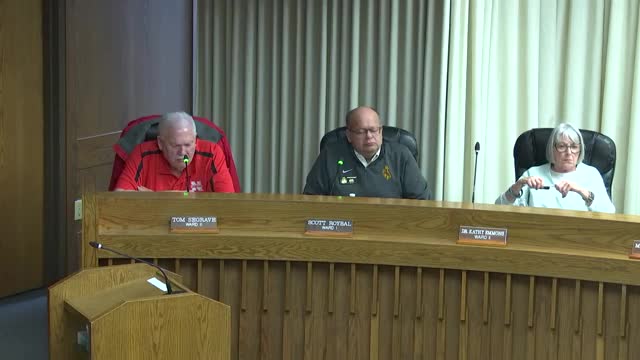Cheyenne to move residential trash pickup to four 10-hour days after route-optimization study
Get AI-powered insights, summaries, and transcripts
Subscribe
Summary
City staff and consultant Univeris presented route-optimization results Jan. 17 showing a shift from five 8-hour collection days to four 10-hour days effective Feb. 1 for residential service, with routes reduced from 30 to 24 and an estimated weekly mileage reduction of 578 miles.
Cheyenne City Council received a presentation Jan. 17, 2025, on a route-optimization project that will move the city's residential trash collection from five 8-hour days to four 10-hour days, with the change set to take effect Feb. 1 for residential customers, Public Works staff said.
"The big challenge ... was moving from 5 days a week service to 4 days a week service," said Gus Esposito, project lead for Univeris Software, the consultant that ran the optimization. The firm tested the city’s current routes against redesigned routes and presented mileage, time and load statistics to the council.
The study compared the city’s baseline routing to optimized runs and found the residential routing mileage dropped from a baseline of 1,627 miles to 1,049 miles — a reduction of 578 miles — while the number of routes was reduced from 30 to 24. Stops on routes rose in the optimized plan from 778 to 976, and average route time increased from about 7 hours to about 8 hours and 49 minutes under the four-day plan.
Why it matters: Public Works staff said the redesign is intended to maintain service to a growing community without adding trucks or drivers. "Our primary goal was to optimize the service ... so that we could continue to provide the service using the same resources," said Vicky Nemechek, Public Works, noting the city expects to keep the same number of drivers and trucks in daily operation while consolidating work into four longer shifts.
Key details and methodology
Univeris described route optimization as a data-driven process that reduces nonservicing travel ("deadheading") and balances load capacity and trips to the transfer facility. The consultant said the software produces a near-complete first draft of routes and that the final 5–10% of adjustments require local operational knowledge (narrow streets, low power lines, school zones) from city staff.
Gus Esposito said the optimization also factors when a truck should make a mid‑day run to the transfer station to avoid long cross‑town deadhead trips. Brahim Ladhar, Univeris optimization technician, and local staff supported the technical presentation.
Staffing, vehicles and operations
Council members asked whether the route reduction would cut driver positions. Nemechek told the council the city plans to keep the same daily complement of drivers and trucks: six routes per day will continue, but run four days a week instead of five. "We have the same number of routes, 6 routes. We're just doing it 4 days a week instead of 5," she said.
Council members asked about overtime and compliance. Nemechek said drivers will continue to work 40 hours per week and the city will provide breaks; overtime will mainly occur on holiday slide days and other exceptions. She confirmed the change does not violate the Fair Labor Standards Act.
Holiday schedule and customer notices
Public Works said it mailed a letter to all residential customers Jan. 15 explaining the change and that a second letter will go to customers whose collection day changed. The department also explained a new "slide" holiday schedule: if a holiday falls on a collection day, service for that day slides one weekday forward (Monday→Tuesday, Tuesday→Wednesday, Wednesday→Thursday, Thursday→Friday); in multi-holiday weeks the schedule may reach Saturday.
Alleys, container placement and safety
Staff said the optimization does not change where containers are collected: if a container is currently picked up in an alley, it will remain in the alley unless the city later decides otherwise. Nemechek said the city is considering hiring a consultant to study alley collection and potential costs of moving containers to the street.
Public Works and council members discussed safety and operational concerns: dead-end and cul-de-sac pickups increase turnaround operations, and the optimization accepted somewhat higher counts of dead-end turns to reduce u-turns. The department will continue to track incidents and accidents; "that data will be available," Nemechek said.
CDL hiring and costs
Council members asked about recruiting and retaining drivers. Nemechek said the city persistently has vacant CDL positions and partners with a local training program that requires a two-year commitment to the city after training. She said roughly five sanitation division employees completed CDL training in the last two years and that the city prefers to hire candidates who already hold CDLs when possible. Staff gave a starting pay figure for CDL drivers as approximately $40,000 annually (does not include benefits).
Remaining work and next steps
Univeris said commercial and compost routing remained in progress (about 90% complete at the time of the presentation). Staff said residents affected by day changes should expect a second mail notice and that the Feb. 1 start date applies to residential customers. No formal council vote was recorded during the work session; staff presented findings and announced implementation timelines and customer notification plans.
